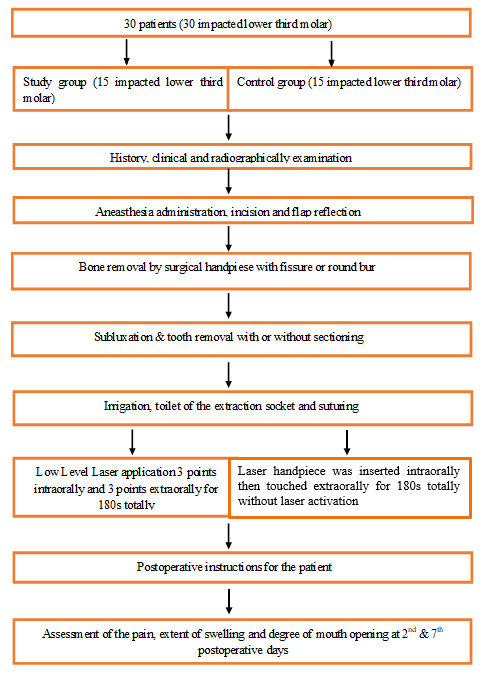Efficacy of low-level laser therapy on postoperative sequelae following extraction of impacted mandibular third molars
Main Article Content
Abstract
Background: In dentistry, extraction of the impacted mandibular third molar is a routine treatment. The most
frequent consequences following this procedure are pain, trismus, and edema. To address these issues, systemic drugs
have been employed; however, due to their side effects, non-medication therapies have evolved, such as cryotherapy,
ice packs, low-level laser therapy, and ozone, which treat these consequences without side effects. Low-level laser
therapy induces biostimulation, speeds up tissue regeneration, enhances wound healing, and reduces pain and swelling
through an anti-inflammatory effect. This might be due to the effect of a low-energy laser that increases phagocytic
activity and the number and diameter of lymphatic vessels, decreases the permeability of blood vessels, and restores
microcapillary function.
Aim: Its purpose was to assess the effects of low-level laser therapy on sequelae following impacted third molar
surgery.
Patients and methods: Thirty patients were enrolled in the current study and were randomly divided into two
equal groups. Preoperative clinical examination included measurement of maximum mouth opening and facial
swelling measurements. The position and configuration of the impacted lower third molar, the surrounding bone, the
mandibular canal, and the neighboring tooth were all assessed radiographically using a panoramic radiograph. Low
level laser therapy was applied extra and intra-orally immediately after surgery. On the second and seventh days after
surgery, the maximum mouth opening and facial swelling dimensions were again assessed in addition to the
measurement of pain by a numerating rating scale. Statistics were used to asses each reading.
Conclusion: A therapeutic option utilizing a low-energy laser following the extraction of impacted mandibular third
molars has clinically beneficial effects on reducing pain, edema, and trismus.
Received 10 Jun. 2023; Revised 31 Aug. 2023; Accepted 17 Sept. 2023; Published online 15 Jun. 2024
* Corresponding Author: [email protected]




